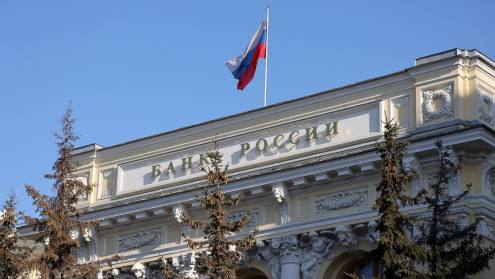The race is on to capture the biggest slice of Russia's lucrative private wealth management market, with top Swiss banks, international retail banks and local asset managers all jockeying for pole position in the Moscow market.
Many of the country's wealthiest individuals still keep the bulk of their wealth overseas. According to PricewaterhouseCoopers (PwC), in 2009 high-net-worth individuals in Russia kept no more than 10% to 15% of their wealth with domestic private banks and asset managers.
But despite the battering Russian markets suffered during the global financial crisis, there is rising demand for onshore money management. PwC estimates that the size of the Russian onshore wealth management market stood at $20bn to $25bn in 2009, more than double its size in 2006, despite the financial crisis. And the accountancy firm estimates market growth at 15% in 2010.
Maintaining growth
Local asset managers expect the market to keep up that double-digit growth rate for the next few years. Asset manager Aton says that before the Russian stock market crash of 2008, there were about 140,000 dollar millionaires in Russia. Market losses cut that number to 90,000, but the numbers are growing fast again.
Growing local wealth creation has boosted the domestic private banking industry, says Steven Hellman, Credit Suisse's chief executive officer for Russia and the Commonwealth of Independent States.
"Increasingly, wealthy Russian individuals will want to keep a sizeable portion of their income onshore and will seek advice around local investment opportunities such as rouble assets," he adds.
Reversing trends
Repeated economic crises prompted wealthy Russians to take most of their money overseas in the 1990s. But as the country's economy matures, that trend is beginning to change.
The government protected the banks after the 2008 economic crisis and kept the currency stable, which has boosted confidence in the country's banking system. Russian bank deposits grew by 30% in 2010, reflecting that growing confidence.
Swiss-born Catherine Thibault, hired by Russian investment bank Troika Dialog as its head of private banking in late 2010, estimates that there are $90bn in liquid assets in Russia and that only 10% to 15% is invested at the moment. By 2013, Troika Dialog expects the pool of liquid assets to grow to $245bn.
"Everyone has identified these numbers and the growth trend, so there is immense competition between foreign and domestic banks. This is a potential bonanza," says Ms Thibault.
Differing approaches
There are different layers within the Russian private wealth management market, with some players targeting ultra-wealthy billionaires who are doing cross-border deals to buy companies, and other wealth managers aiming at individuals with about $1m to $3m of assets under management.
Local banks with premier clients, international universal banks such as Citi or Raiffeisen, international investment banks such as UBS or Credit Suisse and Russian asset management companies such as Troika and Aton all occupy slightly different niches in the private banking universe. But at every level of the market, relationships between the bankers and their clients are key.
"What we are offering is a bespoke service. I think that our financial advisors are almost like private doctors. We are privy to many sensitive things, from the client's psychology to their vacation plans," says Alexey Ischenko, head of wealth management at Aton.
Even Swiss banks that manage their Russian clients' money entirely offshore are now appointing advisors in Moscow who can offer an international standard of service to clients on home territory.
"There is a strong trend towards transparency, with more and more clients banking internationally but wanting a local advisor on the ground. You cannot simply rely on clients flying to Switzerland once a year," says Michael Kunzi, who coordinates the Russian activities of privately held Swiss bank Lombard Odier.
"The Swiss environment is ideal for private banking. It is regulated by simple and logical rules, which at the same time are extremely sophisticated," says Mr Kunzi, but Russian clients want the service brought to their doorstep.
Credit Suisse offers international private banking services, but backs up the service with advisors on the ground in Moscow who can book assets in Russia and give local advice. The bank employs 24 people in private wealth management in Moscow and has expansion plans.
"It is very important to retain local expertise where there is wealth creation," says Mr Hellman.
Cross-border service
With Switzerland such a popular investment destination for Russian high-net-worth individuals, Russian asset managers are also trying to offer their clients a cross-border service.
Russian asset manager Aton opened a Swiss office in 2010, "which will be a good opportunity for our clients to integrate their offshore and onshore assets, and put them in touch with Swiss banking counterparts", says Mr Ischenko.
However, bankers say that complicated onshore accounting regulations in Russia have meant that many local asset managers cannot offer the kind of streamlined service that Russian clients could get internationally. Russian institutions in the wealth management or private banking space often have to provide clients with four different statements for cash, foreign exchange, securities holdings and asset management.
The Russian private banking platform is relatively new. Currency control was only liberalised in 2007 and for many Russian institutions it is still a logistical challenge to offer foreign securities on a local platform.
"One key feature of private banking is simplification: clients want one integrated statement that shows all of their holdings, and one person to talk to," says Mr Kunzi.
Retail banks in Russia will be in a very good position to develop private banking business by identifying the big accounts and segregating them into a different department with better management, he predicts.
"The bottom-up approach could allow retail banks to skim off the cream, because they can allow clients to pay bills and do their ordinary banking in Russia. Because they already have an ATM network and the licence to offer physical cash, they have a huge advantage," says Mr Kunzi, who has worked in private banking in Russia for the past decade.
New entrant
One player that has made a splash in the past year is a relative newcomer to the Russian market. HSBC started its private banking operations there at the height of the global financial crisis.
"Our clients are businessmen, entrepreneurs, chief executive officers, top managers and jet-set celebrities. This is a very young market with almost everyone having made their wealth in the past 10 years. There is very little inherited money," says HSBC’s local head of private banking, Natalia Solodovnikova.
Service is important, and private banking is about relationships. But because the industry is so young in Russia, many of the relationships are still being formed right now, adds Ms Solodovnikova.
HSBC has a wide product platform and a retail business, so the bank is able to serve clients' basic current account needs as well as offering them a global range of investment products, says Ms Solodovnikova. Clients can purchase any international stock or bond as part of a Moscow portfolio, and the bank can give clients one statement that shows all their Russian and international holdings.
“One product that has been popular is a short-term structured note that guarantees the principal invested. Typically, structured notes have a three- to five-year term but Russian clients are not so comfortable with that investment horizon and prefer a six-month instrument,” says Ms Solodovnikova.
She adds that Russian investors tend to be more willing than clients in western Europe to take on a little more risk, as a way to increase their yield. “Many in Russia are more comfortable with risk; they know what it is to build a business, to take risks and win or lose," she says.
High yield
Domestic asset management company Aton has built its private banking service on the back of its equities business. Mr Ischenko says his clients are searching for high-yield investments to outperform interest rates on Russian bank deposits, which are much higher than in the West.
"Ninety-nine percent of our clients come to Aton for our expertise in the Russian stock market. We are not competing for international expertise yet, but hopefully we will," he says.
Aton now has 20 dedicated wealth management staff, with $130m under management from 40 different clients with an average of $3m each in assets. Mr Ischenko predicts another $350m under management by the end of 2011.
Aton's clients hold more than 70% of their assets offshore and a sizable chunk in illiquid investments such as real estate. But most have more than $1m each in assets booked with Aton for investment in the Russian stock market.
Still nervous
However, Mr Ischenko says it may be decades before wealthy Russians are willing to book the majority of their assets in the country. The political environment is a cause of uncertainty.
"Many of the billionaires who own local banks do not put their own cash into their private banks but hold it separately in private companies. There is a lot of noise about the size of the domestic private banking market in Russia, but if you count the beans, you don't have a lot of cash in total," says Mr Kunzi.














